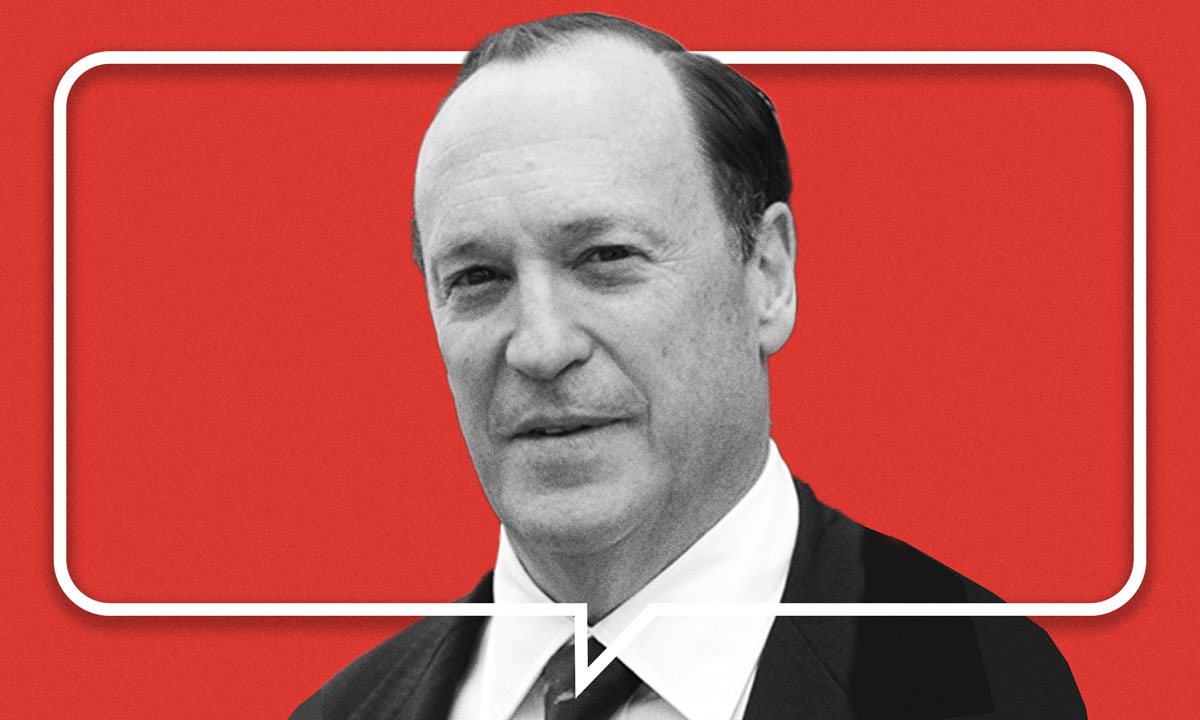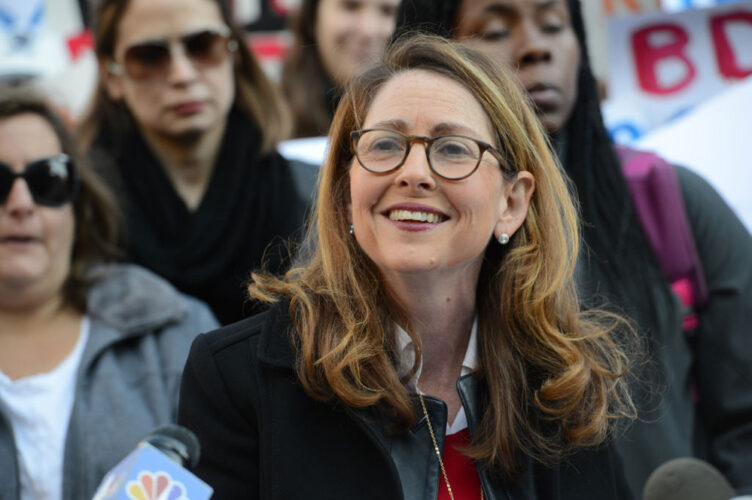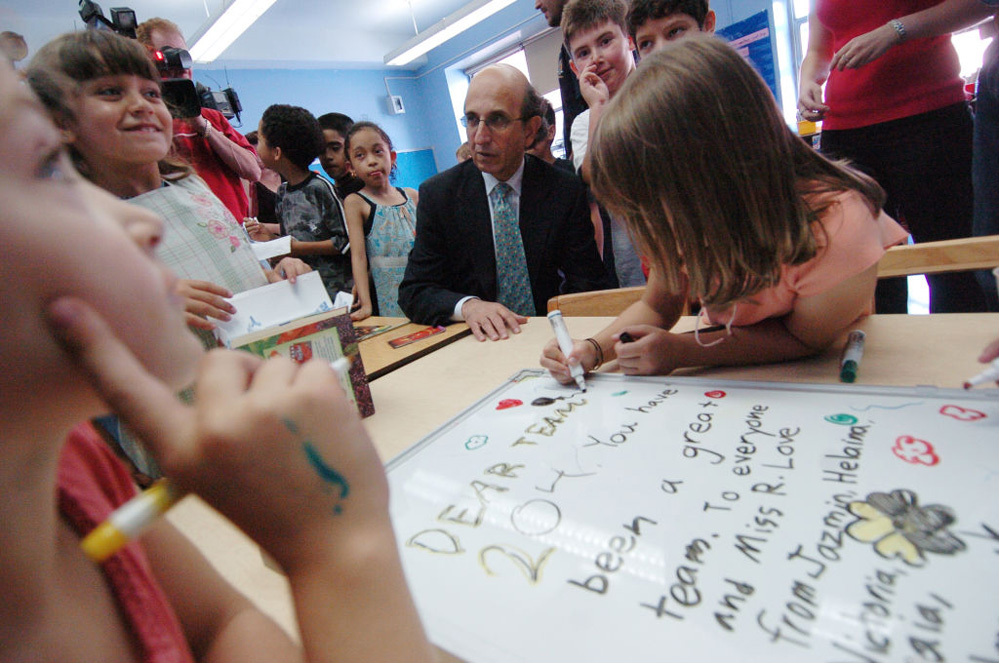15 Years After ‘Rubber Room,’ Steven Brill Recalls the Legacy of School Reform
New York repealed measures that made it easier to fire ineffective teachers. The veteran journalist wonders if they ever mattered.

Get stories like this delivered straight to your inbox. Sign up for The 74 Newsletter
If the education reform was a religion, the “rubber room” was its purgatory.
Famous in the institutional lore of New York City public schools, the rubber room was actually a number of spaces, called Temporary Reassignment Centers, where hundreds of teachers awaited arbitration related to official claims of incompetence, insubordination or abuse. They’d been removed from classrooms and spent years going through the process, all the while receiving full compensation.
When veteran journalist Steven Brill introduced the term into the wider American lexicon with a blockbuster 2009 article published in the New Yorker, it instantly became a byword for the ailments that many believed were ruining American schools: Too-powerful unions protected unfit workers from being fired, while feckless administrators filed paperwork and awaited hearings that might never come. All the while, kids paid the price.
His investigation, later expanded into a book-length treatment, wasn’t greeted with universal praise. Critics accused him of attempting to “demonize” teachers while subjecting deep-pocketed charter school supporters to little of the same scrutiny. In the New York Review of Books, education historian and reform foe Diane Ravitch said Brill’s book was actually “about politics and power, about how a small group of extremely wealthy men have captured national education policy.”
Still, the story became a central text during the reform movement’s golden age, with newly elected President Barack Obama pushing states to tighten academic standards and link decisions on teacher hiring and compensation to standardized test results. Local education leaders — none more prominent than those Brill profiled, New York City Mayor Michael Bloomberg and his chancellor of public schools, Joel Klein — attempted to oblige, often coming into fierce conflict with teachers’ unions through their support of charter schools.
As the most determined reformers discovered, nothing gold can stay. The decade-long push for testing and accountability generated an even stronger response from educators, parents and policymakers, who questioned whether the painful changes being implemented were worth the incremental gains in student test scores. By the middle of the 2010s, Washington had eased off its national pressure, and most districts began to reconsider their own posture toward school improvement.
The latest example: In New York, lawmakers passed a repeal of measures that had allowed districts to expedite the termination process for tenured teachers, effectively allowing each school system to establish its own teacher evaluation process. In July, Gov. Kathy Hochul signed the repeal, which counteracted legislation that had been enacted by her predecessor, the reform-minded Gov. Andrew Cuomo, less than a decade earlier.
Brill professes ambivalence about the change. The rubber room may have been an intolerable feature of schools in his hometown of New York, but he believes the steps taken to eliminate it were largely “cosmetic” to begin with. A student of complex and hard-to-change systems — after writing a book-length treatment of dysfunctional schools, Class Warfare, he moved on to a volume on the problems of the American healthcare system — he strikes a cynical tone on the near-term possibilities for improvement.
In a discussion with The 74’s Kevin Mahnken, Brill spoke about the political shortcomings of reformers like Klein and Michelle Rhee, the organizational exhaustion facing charter schools, and what he describes as teachers’ unions legitimate arguments against education savings accounts.
“If you shift the political power and market power to people getting vouchers, you lose the constituency that funds and manages and holds accountable public schools,” he said.
This conversation has been edited for length and clarity.
The 74: What’s your response to New York reversing course on these policies? And what do you think was the legacy of your reporting on the “rubber room”?
Steven Brill: I have questions of my own about how much policy has actually changed since my story came out.
To the extent that Race to the Top had any effect, it’s long in the past. To win that competition, New York State enacted certain changes in process that pretty much everybody thought were cosmetic and useless. From what I know of the rubber room, the main change was that they stopped having teachers appear in one place, where some pesky reporter could go and find them. They still didn’t have to do any work, they just didn’t have to gather in one place.
To come to your larger question, I’m not sure how much of a difference this repeal makes. I’d want to know if there was some district, somewhere, that actually showed some real teeth in their accountability requirement and now have to abandon that.
If there was an exodus of low-performing teachers from New York classrooms over the last two decades, we never heard about it.
No. And if your only recourse is to fire teachers — as opposed to holding back salary increases from some that need improvement, or giving good ones bonuses — it’s not likely to work anyway.
As far as I could tell, the principal problem of public education had to do with having some quality control, accountability, and incentives. All of which the private sector has in most workplaces, especially workplaces that actually matter, but which there’s a total lack of in public education in New York and a lot of other cities.
The irony is that I went from writing about public education’s failings to writing about healthcare, where I found the problems to be exactly the opposite. In public education, I think it’s generally true that the people actually doing the educating were under-compensated and not given any kind of performance accountability. Whereas in healthcare, the people actually doing the healthcare are also under-compensated, but the ones really ruining the system are everyone except the doctors and nurses and orderlies; it’s the insurance companies, the hospital administrators, the drug companies, the equipment makers.
In other words, in medicine, the people who aren’t abusing the system are the doctors. But in public education, I think there’s a pretty good argument that the people abusing and undermining the system are actually the teachers.
What’s the lesson you draw from that comparison? Are these just the vices of the public sector versus those of the private sector?
What I’m really driving at is that the structure around American healthcare is what undermines it, creating profit incentives for everybody except doctors and nurses acting in good faith. In public education, there are no incentives, and the reason there’s no change is that the workers basically get to help elect their bosses.
I don’t think it’s a matter of doctors being more accountable in the private sector. If you compare public sector doctors with private sector problems, you notice the same problem, which is not the doctors themselves but rather everything around the system.
A moment ago, you mentioned that teacher accountability needs to involve both carrots and sticks. And it’s true that the hard-charging reformers, like New York City’s Joel Klein or Washington, D.C.’s Michelle Rhee, created political problems for themselves by being perceived as hard on teachers. Do you think they should bear most of the responsibility over the intense conflicts that arose over education reform in major school districts?
Maybe people like Joel Klein were just too instinctively combative toward the union, but I would put the onus on the other side. The worst thing you could say to [American Federation of Teachers President] Randi Weingarten, other than that a teacher should be fired, is that a teacher should get a bonus.
I really like Randi, but to her, that idea was extremely divisive. I remember having conversations with her, and she’d say, “Who is a principal to judge what makes an effective teacher?” And I wondered, “If you don’t want to use test scores, what else is there?” In every other workplace, a supervisor is responsible for judging the comparative effectiveness of his workforce in one way or another.
So it goes in both ways. Some of it may have been unduly confrontational from the management side, but it was certainly unduly combative on the workers’ side as well. My view is that we should start by having teachers be much better compensated, and beyond that, we should be able to have positive accountability: If someone’s a really good teacher, they should be able to be promoted rapidly and compensated fairly. That doesn’t happen. It’s not an environment where that can happen.
In charter schools, which have their own set of sustainability problems that I’ve written about, it does happen — maybe to excess, but it happens. If your focus is purely on the kids, it’s easier to just ask the question, “Which teacher is doing the most for kids?” rather than “Which teacher has been breathing for the last 20 years?”

You were writing about these issues at the zenith of the education reform movement, right in the early Obama years. What would you pinpoint as the beginning of the end of that period of possibility?
When did [New York City Mayor Bill] de Blasio get elected? Whenever that was, I’d put it there.
The first time I ever met de Blasio, I was in a public meeting where politicians were arguing over the location of some charter schools. This was in a big auditorium in Lower Manhattan. And this big, tall guy stands up, introduces himself as a city councilman, and says that charters are just a right-wing plot by hedge funders to get rid of public education. It was a big speech.
At the end, when I found him and asked which charters he had in mind, he said he was talking about Success Academy. I asked, “But if they’re so terrible, why would all these parents line up to try to get into the lottery?” He said he didn’t have time to talk, but he gave me his card.
His election as mayor took a lot of the wind out the sails of education reform. Then Rahm Emanuel’s mayoral tenure ended in Chicago, and his successors didn’t feel the same about education reform. So you’d place the implosion somewhere in there. I don’t think there’s any big district run by reformers anymore.
It’s instructive just to look at who’s in charge. Michelle Rhee and Joel Klein haven’t run districts since I was in college. Randi Weingarten is still here, and as close to the pinnacle of the Democratic Party as she’s ever been.
I think the unions basically waited everybody out. Randi helped negotiate with [then-Deputy New York Education Commissioner] John King to get the final Race to the Top application in, and after it went through, I looked through the fine print and called Joel Klein. We just laughed about it because it was such bullshit. You knew it was never going to mean anything.
The only upshot was that they decided, “Why do we have these rubber rooms that a reporter can find? Why don’t we just use the principal’s office in a school or something?” And I think that’s basically what’s happened.
Have your views on charter schools changed? I remember that your observation from this period was essentially that they have some promise for the children enrolled in them, but they can’t possibly be scaled sufficiently to make a meaningful impact on American school quality.
What I always felt about charter schools was that, first, they shouldn’t be thought of as a cure-all because there were always going to be scams and bad schools. And those should be held every bit as accountable, or more so, than a traditional public school.
But there was a second thing that I was always sensitive to as someone who has run companies. And that is, at a certain point after the first or second year, the adrenaline wears off for a young teacher working 10–12 hours a day and meeting with parents and kids on weekends or times of crisis. That experience just has to be made more normal for teachers. One of the young charter teachers that I tracked in my book just experienced a life change when she had kids and couldn’t keep going. You can’t expect people not to burn out and turn over as time goes on.

When I was first looking at them, the energy around the Success Academy schools was equivalent to that of a political campaign. I mean, people were working all-out, 24/7, and it’s hard to make that a permanent thing. [Success Academy founder] Eva Moskowitz has done a very good job of normalizing that. I remember, towards the end of when I was writing my book, the founders of another charter network instituted a rule stating that some proportion of their faculty couldn’t be on email over the weekends. It was the beginning of realizing that the jig was up in terms of everybody running at a full sprint all the time. If you think about a big organization sustaining its energy and its quality, you really have to start doing that.
On the positive side, charters provided competition in the best sense of the word. When I found out that Success Academies co-located in the same building as New York City public schools, I immediately saw that as a perfect story. It was like a science experiment in that there was literally a line going through the building, and the results on either side were so different. What explained it? The money was the same, so it had to be something else.
To me, that is the surviving benefit of charter schools, along with all the value that kids got out of them.
Their value was as a proof point of what could be accomplished?
It should really be an embarrassment. But that’s where politics comes in. People like Randi were willing to sustain the embarrassment for a while and wait it out.
What do you make of the spread of universal education savings account programs? Do you think they could help bring about improvements to public schools, or are you worried about a potential lack of accountability in that sector?
Here’s the theory: If you give me, as a parent, $10,000 dollars a year to get an education for my 10-year-old, and I can spend it on whatever educational costs I choose, then the marketplace will work. I’ll spend my $10,000 in the place where I’ll get the most value, which would typically be defined as the best education in math, reading, civics, athletic opportunities, and everything else a school is supposed to do. It wouldn’t be defined as the best Orthodox Jewish education or indoctrination into a certain political standpoint, but it would be education.
The problem is, how do you try to hold accountable everyone who gets those $10,000 checks? You end up with the same kind of system as public education. Maybe you send your kid to a school down the block with nine other kids, and the total cost of that to the public is $100,000 for 10 students. Someone — and you would think it would be Republicans leading this charge — would want to make sure taxpayers are getting the most for their $100,000.
So how do you do that? I’m asking because I actually don’t know. What does, say, Florida do to make sure kids in a private choice school are reading at the level you want them to? In charters, kids take tests, and the schools’ scores are public. I’m not convinced that a public elementary school should have a monopoly on those kids either; they should have to earn it. But a lot depends on whether we’re holding accountable the schools receiving those $10,000 checks.
A lot of ESA proponents would make the argument that parents themselves hold private schools accountable by voting with their feet and withdrawing their kids if results aren’t good.
Well, take New York. My kids, because their parents have money, all went to private schools in Manhattan. You’d better believe those private schools were accountable for the ridiculous fees they were getting to educate our kids. If they suddenly weren’t getting into college or learning how to read, those schools wouldn’t exist because the marketplace would do its work, and they’d close.
That’s hardly a solution to the shortage of educational opportunity. You can’t say, “Let’s just keep those alternatives for wealthy people and nobody else.” I understand the inclination to not have that be the only alternative to public schools. But you do have to set up some kind of accountability and regulation. In the case of the elite schools on the East Side of Manhattan, the accountability is that parents, by and large, are really sophisticated and tough. Sometimes they’re too tough and too demanding. But it works.
The political war around this issue seems so contentious that you wonder if any kind of compromise exists to introduce a level of accountability besides parental choice.
The other issue the unions raise — and they’re probably right in this case — is that if you shift the political power and market power to people getting vouchers, you lose the constituency that funds and manages and holds accountable public schools.
If I were Randi Weingarten, the example I would use is that of jury duty. This is going to sound way off-topic, but it’s not. Some years ago, a new chief judge was appointed to run the court system in New York, and the first thing she did was get rid of all the exemptions for jury duty. In the past, if you were a good citizen and reported for jury duty, they’d send you to this dingy place where there weren’t enough chairs to sit down and clerks treated you terribly. It was just a miserable experience.

Judge Judith Kaye started hearing complaints from neighbors and lawyer friends and people at her country club, basically saying, “My God, have you seen what it’s like to go to jury duty? It’s disgusting, you can’t use your laptop, the people are so rude!” And jury duty in New York is now a much better environment and much more democratized.
My point is that if there were a constitutional amendment saying that all K–12 schools in the United States needed to be fully public, those schools would get a lot better. Trust me, the kinds of people who ended up in the rubber room would be hounded out. But it’s perfectly tolerable if some kid in Harlem is subject to those teachers while my kid is off at a private school.
As you mention, a situation like that would be politically unworkable. I wonder if we’re heading toward the inverse scenario, in which everyone is given choice.
Another analogue, which is a sign of the times, is to imagine how nice commercial air travel would be if you banned private jets. We should think of the voucher movement in those terms. People are saying, “I’m a captive of these crappy public schools — why are you allowing it? Is it because the teachers elect you?”
Another big change in the education world over the last decade or so has been the dramatic shift in focus toward matters of equity, which has recently proven controversial in some of its manifestations. I’m thinking of San Francisco trying to stop teaching Algebra in eighth-grade, or KIPP changing its slogan from “Work hard. Be nice.” What’s your view on these developments?
I think it’s just awful. The idea that working hard was something negative — what does it even mean?
I wrote a book about the problems of the intensely merit-based society that we’ve become. But it was really meant to be a critique of how we decide merit. The idea that everybody should have the same outcome, rather than the same opportunity, is just ridiculous. Politically it’s a total loser because obviously most people think they’re the exception in some way.
Another area where we’re seeing the debate over merit play out is in college admissions, where high-prestige institutions are now returning to the use of tests like the SAT to determine their applicants’ ability. For a few years there, it looked like we might be through with them.
The first long magazine article I ever wrote was about what a scam the Educational Testing Service and the College Board were. But that had to do with the merits of the test, not the idea of testing for merit. If you’re left with nothing but your high school grades to get into college, and the Ivy League just accepts the top 2 percent of every school, that doesn’t work. That’s saying to parents, “Whatever you do, don’t send your kids to Stuyvesant or Brooklyn Tech because the odds of finishing in the top 2 percent are tiny.”
What I try to set aside is the question of whether the merit-based tests reflect true merit. Life is always unfair in different ways. I always wanted to be a pitcher for the Yankees, but if the tryouts involve how fast you can throw a baseball, it’s not going to work out. That’s just how life is.
When I spoke with Bill Gates last year, he compared school improvement efforts very unfavorably with his foundation’s successful work to lower malaria deaths. Specifically, he called American K–12 schools a “challenged space.” Would you agree with that assessment? If so, why?
That’s a very interesting observation. I think it’s because nobody’s against cutting malaria.
The malaria lobby isn’t that strong. But you run into a whole set of challenges when you do all the things Gates tried with schools. And some of his investments were entirely logical!
He was willing to invest money in having teachers be able to be observed by their supervisors. Who could be against that? It turns out, a lot of unions were.
So again, who is against holding teachers accountable, both in a positive and a negative way? Who’s against changing the type of textbooks that get used? The people who sell the current textbooks. Who’s against having schools structured in a new way? The people whose jobs depend upon the current structure.
I have a house in a village in Westchester called Katonah. Katonah is part of Bedford, but each place has a separate school district, and each district has a superintendent who supervises the same number of students as a large middle school in the Bronx. And the last time I looked, each of those people had a salary nearly equivalent to Joel Klein’s when he was the chancellor of New York City schools.
But if you try to merge 6–10 school districts in Westchester and form a school system about half the size of the Bronx, you’ll get resistance from whoever is the superintendent, the deputy superintendent, the general counsel, the purchase manager, and anyone else who has good jobs in those districts. That’s different from finding a cure for malaria.
Get stories like these delivered straight to your inbox. Sign up for The 74 Newsletter

;)
